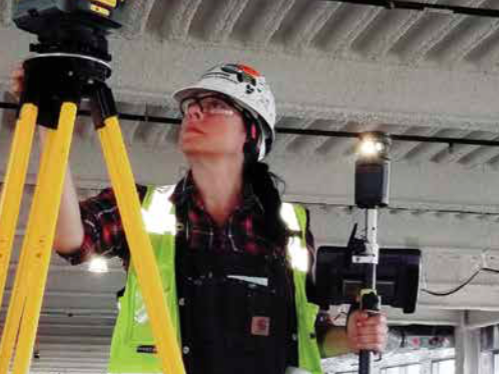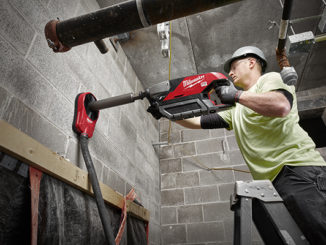By / Jessica Kirby
Over the past three decades, thousands of women and men have taken strides to open doors, o er a helping hand, and demonstrate commitment, dedication, and – in some cases – unstoppable bravery in the move towards grater diversity in the construction industry, Sheet Metal Journal – Western Washington profiles just three of the industry’s success stories.
Grace Pizzey: Success Through Balance
 Some would say Grace Pizzey’s rise from temp receptionist to company vice-president is a classic Cinderella tale, but it is in fact a story of progress, determination, supportive mentors, and a dynamic company culture.
Some would say Grace Pizzey’s rise from temp receptionist to company vice-president is a classic Cinderella tale, but it is in fact a story of progress, determination, supportive mentors, and a dynamic company culture.
Pizzey graduated from the Colorado College in 1990 and moved to Seattle. She started as a temporary receptionist at Holaday-Parks, where she quickly demonstrated her aptitude and interest for learning about the industry. After a few months, Holaday-Parks asked her to stay on as assistant controller.
In that role she learned accounts receivable, billing, collections, and other day-to-day, behind-the-scenes systems driving the company’s successful operation. “Collections is an interesting way in and to understand a company,” she says. “Any time there was a slow payment or dispute I would find out what happened, dig into the job, and find a way to make things right.”
As Pizzey’s title grew to controller and then vice-president, her responsibilities grew to negotiating contract terms,
settling disputes and managing insurance, banking, bonding relationships, and internal departments including accounting, human resources, administration, and purchasing.
When Pizzey joined Holaday-Parks, it was a small family- owned business. The company has since grown from annual revenues of $30 million to over $150 million. When the last member of the original family decided to retire, the company stock was sold to a small group of long-term employees, including Pizzey.
She loves the industry because of its dynamic, changing nature. “The amount of coordination required among so many different trades is staggering,” she says. “My favorite thing is driving through town noticing all of the different projects that we had a part in. Construction provides a unique opportunity to shape the community you live in.”
Her awe of the built environment is superseded only by her respect and admiration for the people who do the work. “Our people are smart and hardworking,” she says. “They have to have so much strength and tenacity to get things done.”
Company management was supportive of Pizzey’s climb through the ranks, allowing her to bring each of her three children to work for the first six months, and accommodating family commitments. “Holaday-Parks did everything they could for me,” she said. “They bent over backwards to ensure that I could succeed at work and at home. We have made similar accommodations for many people, which allows us to retain key employees, and lets them know they’re valued members of our team.”
Allowances made when Pizzey’s children were young are part of a larger, over-arching workplace culture that sees life as a series of events, planned and unplanned, and that supports employees in tackling the repercussions of those events as they arise and in good faith.
“Cancer, aging parents, babies—we all have challenges,” says Pizzey.
Her hallmark tips for success in the industry and in business in general are plain: treat all people with respect and recognize your perspective is only one perspective. You aren’t learning anything when you are talking, she adds. Do a good job, do it all the way through and finish well; take every opportunity to help other people.
These principles drive the workplace culture at Holaday- Parks.
“We don’t have a lot of people doing the same job. We have ownership in the work we perform,” says Pizzey. “My boss is amazing and so gracious. He taught me to listen carefully to other people. By fully understanding issues, we have had great success finding individual solutions to life’s challenges.
“When you hire smart, dedicated people who care about the job, they will make it happen and you can trust them to get the job done.”
As a mid-sized company, it is possible to choose carefully who is hired and really pronounce the importance of work ethic, says Pizzey. She has been at Holaday-Parks since she was 22 so it is the only work culture she knows. “I am not sure you could do it on a giant scale,” she says. “In a company like ours we have low turnover. We know each other well. Those who aren’t committed don’t choose to stay.”
Pizzey encourages prospective workers to explore the construction industry and recognize the phenomenal opportunities offered in the office and union employment.
“You have to be smart and strong and it’s true—it is a male- dominated field,” she says. “But they don’t care about gender or race—they just want people who can do the work well.”
She has spoken to countless youth and impressed the fact that, yes, it is physically and mentally demanding work, but it is a no-debt and high paying environment.
“The unions are trying to add women and we just can’t find them,” she says. “This job is a fantastic opportunity. I’ve rarely spoken to a union worker who said, ‘I wish I had an office job.’”
For those who do want office jobs, construction offers those, too. “In that case you want a construction management, engineering or finance degree,” she says. “There are many possibilities. Set yourself up for success, and try to anticipate the moves you will have to make to get to meet your goals.
“Things don’t just happen to you. If you want it, go for it, and don’t get mad about road blocks. Figure out why they happen and adjust.”
–
Vanessa Carman: Attitude is Everything
 Vanessa Carman had no idea she would leave her accounting job and enter the sheet metal industry until her brother, a service technician, asked her to help him change a furnace at their uncle’s house.
Vanessa Carman had no idea she would leave her accounting job and enter the sheet metal industry until her brother, a service technician, asked her to help him change a furnace at their uncle’s house.
“I knew right away I wanted to do [sheet metal work],” she says. “And the timing was good … I was pretty bored with accounting.
She didn’t go straight to the union; instead she started applying for sheet metal work but never got a call. She solved that problem quickly: “Instead of stating my name as ‘Vanessa’ I started putting ‘Van’, and I started getting calls.”
Of course, she didn’t get the first job she applied for. In fact, most of the call backs she received at the time were made out of curiosity. “Once they figured out I was a woman, some would call me in just to ridicule me,” she says. “They would ask, ‘Are you sure you can do this? It’s pretty heavy work for a girl you know.’”
Good thing for Carman’s competitive drive and complete inability to give up. “I couldn’t quit,” she says. “There are jerks everywhere. The attitude I take is that I’m not going to let them win. They won’t take this opportunity from my family.”
She started off in entry level warehouse positions, figuring she’d get trained as an installer. A non-union residential company gave her a start, but after she became a single mom to three she realized she needed the immense opportunities the union provides.
“I wanted to move forward in my career, and I wanted better insurance and benefits for my family,” she says. “I started at the bottom and worked through a full five-year apprenticeship.”
That was 15 years ago. Attitudes in the industry have changed dramatically, and as labor shortages loom and the call is out for diverse recruitment, women are finding their way into far more welcoming scenarios.
“The message now is, ‘Women, come in. Let’s diversify,’” says Carman. “The new generations in school are learning to be ‘color blind’ and they don’t see race or gender. I believe there can be workforce equality in the future. The trades are not perfect out there and there are still people stuck in their ways and behaviors, but it is a lot better.”
Carman loves working with her hands. She loves learning new things and rewarding work with diverse opportunities.
“Ours is the only trade where we fabricate what we install, so the job involves detailing, shop work, layout, installation, and specialty welding … there are so many paths you can choose. It’s up to you where you can go.
A living wage and the ability to provide for her family are also obvious draws to the sheet metal industry. To do that and love what she does make it an unbeatable industry, one she gives back to with leadership, determination, and a strong work ethic.
“It took a long time for me to find my voice,” she says. “As the only woman on some jobs it was an isolated world and it took me some time to stand up for myself and demonstrate some leadership.
“I want everyone to succeed, but I have a passion for mentoring sisters,” she says. “I understand the struggles women are
facing, and I recognize that it is important to recruit and retain the best people for the industry.”
Carman’s number one tip for facing challenges in the industry is be strong with a positive attitude. “Through the years you pick your battles and that is what I have done,” she says. “Continue to have good, positive attitude and your allies will recognize you are in it for the right reasons.”
Her advice to contractors looking to recruit women is to ensure equality—no, seriously.
“We need a fair, competitive career path for everyone,” she says. Another advantage would be a shift in how harassment and discrimination training is presented.
“I’m tired of hearing what we are supposed to do to report harassment,” she says. “It shouldn’t be our issue. We should encourage diversity training for everyone and focus on prevention of harassment and discrimination.”
Apprentices should receive this message loud and clear on the first day, she adds, and companies could encourage mentor groups to help new recruits feel confident reaching for support.
“Good days and bad days are going to happen,” is Carman’s message to women considering a career in the sheet metal trade. “Don’t just jump in for the wages. Research all trades, sign up for a pre-apprenticeship program, take a tour of your JATC, visit a job site or shop, and see if it is for you.
“Take care of your body and be prepared to use it—it is not always easy. Anyone can do it, but it is not for everyone,” she says. “But this was my challenge and what I signed up for and I’m glad I did.”
Vanessa Carman also chairs the Women’s Committee at Local 66, promoting recruitment, retention, and mentorship opportunities for women in sheet metal. See page 10 for more information about this and other similar programs.
–
Chelsea Reynolds: Fulfillment in Field Work
 Chelsea Reynolds is an apprentice at Holaday-Parks and she has been around the block. After five years as a welder, she entered the sheet metal industry, where she has worked hard for her success and earned the pride she has in her accomplishments. Reynolds got her first taste of general trades in the metals shop in high school. Her teacher noticed she was really good and suggested Reynolds pursue something other than a four- year university course.
Chelsea Reynolds is an apprentice at Holaday-Parks and she has been around the block. After five years as a welder, she entered the sheet metal industry, where she has worked hard for her success and earned the pride she has in her accomplishments. Reynolds got her first taste of general trades in the metals shop in high school. Her teacher noticed she was really good and suggested Reynolds pursue something other than a four- year university course.
She went to Lake Washington Technical and entered the welding tech department. She graduated from there after two and half years with an associate of applied science in welding and fabrication technology.
She was doing a production weld job for about three years but it wasn’t quite what she was looking for, so she decided to look for other options in the trade.
“My dad suggested I look into the sheet metal apprenticeship or pipe fitters because of the great benefits, retirement plan, and I could still use my welding skills while learning other things—make myself more valuable,” she says. “Not to mention that sheet metal sounded attractive because it ended up being much kinder to my body long term.”
She called the Local 66 union hall and scheduled a general knowledge test, took it, and passed and, “Ta-da! I made the list. Got through that bit of awesome and waited for that infamous call that said, ‘Welcome new apprentice 2014’. Talk about a good way to start off the new year.”
Reynolds has been in the industry since, currently working as an apprentice for Holaday-Parks. Her big draw to the job is that she is on her feet, away from a desk, and in the field where she feels most comfortable.
“Fabricating things, making something with your hands is very gratifying,” says Reynolds. “At any time I can go driving and can point at one building or another and say, ‘I was apart of that. I helped build it.’”
Welding was an important talent that served her well in her job search. “I was good and fast,” she says . “And I can fit in
all those tight/odd spaces the other guys can’t. Not always fun but I get paid anyway.
“I believe in having fun at my job; a little humor goes a long way,” she says. “And most appreciate having a few laughs during the day. I suppose I stand out because I usually end up being the only lady on a crew or a job, but I don’t mind it all that much. The camaraderie is fun.”
Her career choice has had its share of challenges, too. The “school part” can be challenging, and math has never been Reynolds’ favorite subject. She has experienced sexual harassment, physically and verbally, and she’s been asked to throw in a bad weld once in a while so she doesn’t make the guys look bad. She’s had a little trouble in her apprenticeship with not being given enough responsibility or the chance to advance offered to other students.
These incidences are no match for her tenacity. Reynolds is positive, strong, and finds camaraderie with her crew. “I’m not alone in the [schooling struggles] part,” she says. “My class is a pretty tight group. Most of the time the guys are good to me and if they’re not they are reminded to treat me better or else.
“I’ve had some tough goings but you just have to keep pushing to get what you want. I’m fortunate enough to not have [harassment] happen on a regular basis, and the times that it did happen, my crew had my back, which is very reassuring that I don’t have to stand alone.”
In 2015, Local 66 established a women’s committee that offers support and mentorship for women in the sheet metal industry. This has been a source of help for Reynolds as she continues to navigate her successful place in the industry.
“I can talk to anyone of my fellow lady members who understand what it’s like to be in this industry,” she says. “Especially if I’m not comfortable with discussing whatever happens with the guys or other male superiors.”
Reynolds encourages industry to promote the trades in school, or have trade-oriented classes so students have a way of exploring options other than university. “Not everyone is meant to be in an office,” she says. “Working with your hands is pretty cool. Also, I’m not going to lie, the money part is pretty sweet, too.”
Benefits like health insurance and job security make the trades a no-brainer for Reynolds, who encourages more women to look into sheet metal as a career option, but only if they are tough enough.
“You have to have a thick skin … this is an industry that will chew you up and spit you out,” she says. “This is not for the princess types or anyone afraid of dirt and grime.”
Success means learning to find middle ground with your crews and letting superiors know you are there eager to work and learn.
“I have faired better than most because I’ve had more time in the trades and I’m use to certain kinds of personalities,” she says. “As modern as times are there are still a few narrow- minded guys out there who think women don’t belong, which is their opinion, a crap one, too. Just be tough and show them up with skills and punctuality.”



